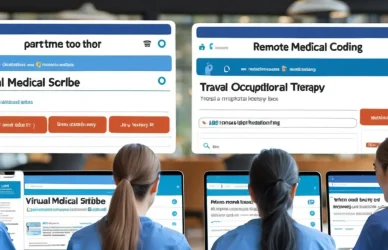In the world of healthcare, where trust, precision, and compassion define your professional journey, a strong personal reference can make all the difference. Whether you’re applying for part time hospital jobs or aiming for medical director roles, a reference acts as a stamp of credibility—validating your clinical skills and moral character.
Employers in this field are not only looking for educational qualifications or job experience but also for signs that you are dependable, ethical, and truly passionate about care. This is especially critical in positions like doctor’s assistant, nurse practitioner jobs, and physician assistant roles.
Why Personal References Matter in the Healthcare Field
Healthcare isn’t just about what’s on paper. It’s about how you interact with patients, handle high-pressure situations, and work in interdisciplinary teams. A personal reference provides insight into all those soft skills that aren’t captured on a résumé.
Let’s say you’re applying for healthcare work from home positions. While your technical capabilities matter, employers want assurance that you can work independently, manage confidential patient data, and collaborate virtually. That’s where a solid reference from a former remote supervisor or team lead becomes crucial.
Types of References You Can Use
Different healthcare roles call for different kinds of references. Here are a few types that carry weight:
- Clinical Supervisors: Ideal for hospital or emergency care jobs like hospitalist jobs or RN positions
- Academic Mentors: Perfect for students or those applying for university hospital careers
- Volunteer Coordinators: Great for entry-level applicants in roles like medical assistant jobs
- Colleagues or Team Leads: Useful in healthcare IT jobs or work from home medical jobs
Each reference should be tailored to support the specific job type you’re applying for.
Choosing the Right Reference for Different Healthcare Jobs
Not all references are created equal. A reference who watched you lead a team in a busy ER is more valuable for physician jobs than someone you casually volunteered with.
Let’s align some references with relevant roles:
Healthcare Job Title | Ideal Reference |
Physician Assistant Jobs | Clinical supervisor or senior PA |
Memorial Hospital Career | Hospital administrator or nurse educator |
Work From Home Health Care Jobs | Remote team manager or project lead |
HCA Healthcare Jobs | Supervisor within an HCA-affiliated facility |
Good Samaritan Hospital Jobs | Department head or HR officer from Good Samaritan |
IT Positions in Healthcare | Healthcare IT coordinator or team leader |
By choosing strategically, you make your application stand out with contextual relevance.
How to Ask for a Reference Professionally
Here’s how to do it right:
- Ask Early: Don’t wait until the last minute. People appreciate notice.
- Be Specific: Let them know the job you’re applying for and what qualities you’d like them to highlight.
- Provide Background: Send your updated resume, the job posting (e.g., hca job listings), and a few talking points.
- Always Say Thank You: A handwritten note or email goes a long way.
What Employers Look for in a Reference
Employers want to know:
- Can you be trusted with patients and sensitive information?
- How do you perform under pressure?
- What do your peers think of you?
References for chief medical officer jobs or career medical officer jobs need to reflect leadership, decision-making ability, and communication skills.
Leveraging References for Entry-Level and Student Roles
If you’re a student eyeing memorial hospital hiring or health care jobs, you might not have clinical job experience. That’s okay! Professors, internship preceptors, or research supervisors can speak about your professionalism, eagerness to learn, and punctuality.
Make sure they can vouch for your potential in real-world medical settings.
Using References in Your Resume and Cover Letter
While you don’t always need to list them directly on your resume, you should indicate that references are “available upon request.” However, when applying for medical jobs from home or remote nursing positions, it’s helpful to provide LinkedIn links or brief testimonials embedded in your cover letter or portfolio.
The Role of References in Remote and Work-from-Home Healthcare Jobs
As virtual care grows, employers offering work from home healthcare jobs need to verify more than just your internet speed. They want to know:
- Can you self-manage?
- Are you reliable?
- Do you have strong communication skills?
References that speak to your remote work ethic are game-changers in this space.
Digital Tools to Manage and Store References
In a fast-paced and digitized hiring landscape, it’s essential to manage your personal references just as you would your résumé or license. Here are a few helpful platforms and practices:
- LinkedIn Recommendations: Ask former colleagues or managers to endorse your skills. These serve as public and easily accessible testimonials.
- Google Drive or Dropbox Folders: Store PDF versions of reference letters categorized by job type (e.g., medical jobs, HCA careers, etc.).
- Professional Portfolio Websites: If you’re applying for healthcare IT jobs, consider integrating references and testimonials on a professional site to create a standout impression.
These tools are especially useful when applying for multiple roles, such as work from home medical jobs, physician positions, or university hospital jobs.
Common Mistakes to Avoid When Using Personal References
Even the most qualified healthcare professionals can slip up when it comes to references. Avoid these pitfalls:
- Using Outdated References: A glowing review from ten years ago doesn’t carry the same weight today.
- Choosing Irrelevant Contacts: Your gym trainer may think you’re great, but they’re not the best fit for verifying your readiness for RN open positions.
- Failing to Inform Your Reference: Never use someone as a reference without asking first. They may be caught off guard and provide less impactful feedback.
- Not Matching the Role: If you’re applying for chief medical officer jobs, a reference from a nursing school instructor might not align with leadership expectations.
Final Tips to Strengthen Your Job Application with References
Here’s how you can make your personal references work for you across various healthcare applications:
- Customize Your References: Align each reference to the job’s core competencies—especially for roles listed under HCA job postings, healthcare jobs, or medical care jobs.
- Keep Your References Informed: Let them know about your applications, the company culture, and role expectations so they can tailor their recommendation.
- Use Reference Letters Strategically: Especially for career medical officer jobs or competitive nursing positions, include letters when you sense they can make a positive impact.
Remember, a thoughtful reference isn’t just a formality—it’s an amplifier of your achievements and your potential.






